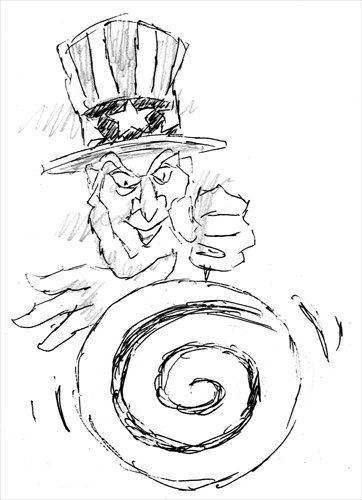‘Absurdly ridiculous’ sound bites souring trust

Illustration: Peter C. Espina/GT
Insensitive remarks aired on entertainment TV shows are causing quite a stir among Chinese mainland audiences these days.
First, it was the US' ABC late-night talk-show host Jimmy Kimmel last month, who outraged Chinese people when he winked at a 6-year-old kid, after the boy had suggested that "killing all the Chinese" would solve the US debt problem.
Now, comments made on some Taiwan-based entertainment TV shows have also angered people on the mainland.
The remarks made by some Taiwanese people, such as: "Most mainlanders cannot even afford the most common snack - marble egg."
While quips like: "On the mainland, only the richest people wear pajamas to actually go to bed," and; "Henan and Hebei are the poorest provinces in China, where few local residents can even afford frozen dumplings," are contributing to a war of words online between mainlanders and Taiwanese people.
A BBS feed on Tianya Club, one of the mainland's most active online forums, where the clips were posted about a week ago, had received over 1 million hits and some 7,000-plus comments by press time. Most Net users on the mainland referred to the sound bites as "absurdly ridiculous."
Some mainlanders have even called the Taiwanese people who made the slights "The frogs of the Island," playing off a term coined by The Frog of the Well, a Chinese fable told by influential philosopher Zhuang Zi. The tale insinuates that ignorant people know nothing outside of their own world.
Mainlanders are also upset with how their fellow Taiwanese have found a way to belittle them on popular reality TV show Dad, Where Are We Going?
Sponsored by Hunan TV, the show that has caught the eyes of millions of mainland viewers in recent months features a group of fathers, mostly celebrities, and their children, as they travel to rural or remote areas on the mainland.
It has also gained attention across the Taiwan Straits, thanks to a father-and-son duo who hail from Taiwan.
But the show has received lopsided reviews from Taiwan-based Net users, who have complimented only the Taiwan-born father and son for being so well-behaved and even good-looking, comparing them to the other contestants from the mainland.
Perhaps, for mainland people like me, who have never traveled to Taiwan, it is hard to tell if this is really what Taiwanese people think of their mainland compatriots, when their eyes gaze across the Straits.
A mainland friend of mine, who completed a one-year master's communications program in Taiwan before returning home, said that some Taiwan-made entertainment shows are eager to overlook satirical slights made by guests so long as their remarks boost ratings.
In fact, my friend said that while such shows tend to highlight some of the most ignorant mainland views held by Taiwanese people on TV, in reality, many Taiwanese actually have extensive knowledge about the mainland.
Misunderstandings, over-exaggerations and fabrications, indeed, are major barriers to forming trust on both sides.
But rather than legitimizing obnoxious sound bites on TV, mainlanders and Taiwanese people should make more of an effort to get to know one another - be it through travel, outreach or educational exchanges - otherwise ratings-driven entertainment shows may continue to succeed at amplifying "absurdly ridiculous" misconceptions and prejudices.
The author is a reporter with the Global Times. liuzhun@globaltimes.com.cn